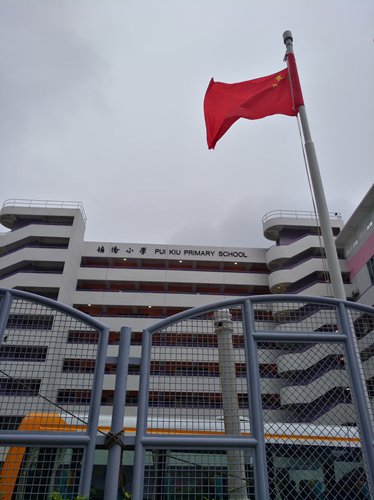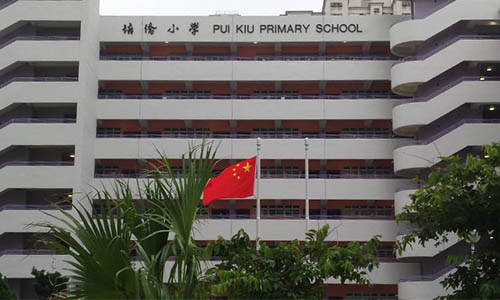HOME >> CHINA
HK govt reiterates opposition to school strikes
By Wang Wenwen, Chen Qingqing in Hong Kong and Cao Siqi in Beijing Source:Global Times Published: 2019/9/2 17:16:36 Last Updated: 2019/9/2 18:45:05
Not the place for political wrangling: official

Chinese national flag flies at the Pui Kiu Primary School in Hong Kong on Monday, first day of the new semester. Photo: Wang Wenwen/GT
The Hong Kong Special Administrative Region (HKSAR) government on Monday reiterated its opposition to school strikes as around 70,000 primary and secondary school students welcomed their first day of new school year following the weekend unrest which left the city in chaos.
Despite the opposition forces' call for a student strike, and local media reporting that organizers estimated as many as 10,000 secondary students from close to 200 schools would boycott classes, SAR Secretary for Education Kevin Yeung Yun-hung said at Monday afternoon's press conference that most of the schools are functioning normally in the first school day.
Protesters were seen forming human chains outside some schools. The schools have professionally communicated and interacted with students in accordance with their own rules, Yeung said.
Local media reported some students started protesting Monday morning. Students in three secondary schools at Chai Wan formed human chains in front of their campuses at around 7 am.
Media reports said some students skipped school and showed up at Edinburgh Square in Central at 9:30 am, while others joined a rally at about noon after classes ended early on the first day.
Around 300 protesters, some wearing school uniforms while others wearing masks, organized a protest at a playground outside Fukien Secondary School in Chai Wan on Monday afternoon. But they left after staying there for 10 minutes, the Global Times reporter observed. Two girls who attended the gathering said some of the participants were not students but nearby residents.
HK Chief Secretary for Administration Matthew Cheung Kin-chung stressed at the press conference that the government opposes all attempts that put politics above education.
Monday is the first day of school, and the HKSAR government has repeatedly made it clear that it is opposed to a strike. Schools should not be places for political wrangling, said Cheung, pledging to support the police's right to ensure public security.
Yeung said he appreciates the principals and teachers for their professional handling of different situations at such a critical time, and said the schools will also pay close attention to bullying and ensure that all students are able to study in a safe environment.
Some people have attempted to bring the city's confrontations into schools and even threatened to harm police officers' children by posting their personal information on the internet.
In response to media reports that some students knelt to express their appeals, Yeung said the government's position is clear. "Anyone who reasonably and legally expresses opinions and demands is always respected."
As to the question on why the government deployed police and a kind of "white terror," Yeung said some protesters formed human chains outside schools, which is different from a strike.
"The police presence is meant to ensure public safety and should not be seen as 'white terror'," he noted.

Photo: Wang Wenwen/GT
Limited strikes
Insiders told the Global Times that the strikes mainly happened in religious schools and government-run public schools, while international schools were less affected.
A middle school student told the Global Times that students in his school did not participate in the boycott and have no connection with the college students [who vowed to boycott classes].
He said he was not worried in school and hopes the situation is resolved in a peaceful way.
The Global Times decided to protect the student's identity.
The Global Times reporter saw scattered pamphlets calling on freeing Hong Kong at St Francis' Canossian College in Wan Chai - Hong Kong Chief Executive Carrie Lam Cheng Yuet-ngor's alma mater - where media reports said some students joined the boycott in the morning.
An employee at the school's security office told the Global Times that no strike took place at the school and students who participated in the protest in the morning were "just passing by."
Tang Fei, the principal of Hong Kong's Heung To Secondary School, told the Global Times this strike was probably far from the effect the opposition wanted to achieve, a result consistent with the efforts of the education bureau, educational groups and schools.
The Hong Kong Education Bureau issued guidelines on August 20, clearly opposing strikes, saying that strikes are against educational regulations and funding rules. Meanwhile, teachers will not be protected by labor legislation if they engage in political strikes.
Normal operations
Several school principals have expressed their opposition to the strike, calling on the students to respect each other, think rationally, and urged society to help return children to school, Hong Kong newspaper Ta Kung Pao reported.
Over 800 students attended the beginning-of-term assembly at Piu Kiu Middle School on Monday. Professor Jasper Tsang Yok-sing encouraged students to study hard and remain open-minded, especially amid social unrest.
The Chinese University of Hong Kong (CUHK) issued a notice on Monday morning, saying that, given the previous two days' tumultuous situation, the university students' planned Monday assembly at the University Mall may encounter safety risks. The university informed the student union to cancel the assembly.
Wong Kam Leung, principal of H.K.F.E.W. Wong Cho Bau School and chairman of the Hong Kong Federation of Education Workers, told the Global Times that the schools that love the country and love Hong Kong will not support the boycott.
"The most important thing is that if the school has a clear position against the strike, the students will not take the initiative to call for a strike," Wong said.
On Monday, Wong's school functioned normally, and the Chinese national flag was raised at the opening ceremony.
Wong said he is concerned about the social pressure the students were subjected during the summer vacation.
"Some may be unhappy," he said, adding that teachers and professional staff have been told to keep an eye on the students' emotions and provide counseling when necessary.
Political controversy has spread to the campuses. Some people advocated strikes, which will hinder the normal studies of students and also affect relations between students and teachers with different political views. It is worrying many parents, Victor Chan, vice chairman of the Hong Kong Association of Young Commentators, told the Global Times.
The protests are very complicated and have showed signs of terrorism. The involvement of underage students will not help solve the problem, but put them in danger. To protect their normal studies and safety, Hong Kong society should prevent underage students from participating in strikes and political movements, said Chan.
Newspaper headline: HK govt slams school strikes
Posted in: POLITICS,HK/MACAO/TAIWAN